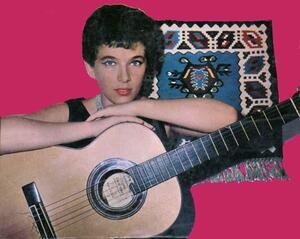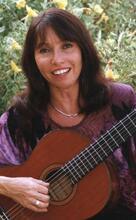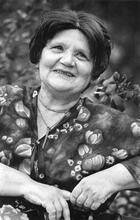Nechama Hendel
Nechama Hendel was beloved for her soulful contributions to Israeli folk music. She joined the Nahal military entertainment unit for her army duty and quickly became one of their top vocalists. After performing in America, Hendel started a solo career in Israel. She studied music theory and began collecting Ladino and Yiddish folk songs, which she then performed on the radio, re-introducing them to the public. She created a beloved album of music with lyrics by Hayyim Bialik. Hendel gained a following and performed internationally, but she returned to Israel to entertain the troops during the Six-Day War. When Hendel married a non-Jew and settled in West Germany, Israeli audiences were furious and panned her subsequent albums despite her continued devotion to Jewish folk music.
In 1961, Nechama Hendel’s powerful, crystal-clear voice was heard over Israel Radio (Kol Israel) singing her own Hebrew version of the famous Yiddish song “Dona Dona” (lyrics by Aaron Zeitlin, melody by Shalom Secunda). In response to popular demand, the recording was broadcast frequently. Clearly, its text moved the Israeli public, lamenting the tragic condition of Russian Jews under pogroms in the early part of the twentieth century and yet expressing hope and strength:
Calves are easily bound and slaughtered
Never knowing the reason why:
But whoever treasures freedom
Like the swallow has learned to fly.
This version of “Dona Dona,” which aroused the admiration of Israelis from all walks of life, became one of Hendel’s musical trademarks throughout her dramatic and intensive career. Due to this recording and her other performances of Jewish and Israeli songs, as well as songs from other cultures and countries, she ranked as one of the foremost singers Israel has ever produced.
Early Life and Education
As a child Hendel dreamt of becoming an actress. She loved the theater all her life and even participated in some plays, musicals and films, but singing gradually became her main occupation.
Nechama Hendel was born on August 22, 1936 in Jerusalem, where her family lived in the upper-middle-class district of Rehavia. Both parents immigrated to Palestine from Poland. Her father, Michael Hendel (1899–1965), was born in Bolochow (Bolokhuv) and her mother, Chana Foyerstein (1900–1986), was born in Warsaw. Her father served for many years as chief inspector of history at the Israel Ministry of Education. Her older sister, Tamar Gadot, was born in 1934.
After successfully finishing her primary and secondary schooling Hendel studied for one academic year at the Hebrew University. In 1954, as part of her military service, she joined the Nahal military entertainment unit, the best-known and most respected of such troupes. Here she gained experience as a performer and established herself as one of the leading vocalists in the group. Following her military service, Hendel went to Paris in the winter of 1956 to study acting but was called home in 1957 to join a newly founded professional Israeli entertaining ensemble, Bazal Yarok (Green Onion), composed of former colleagues from the Nahal group. Again she played an outstanding role as a solo singer. Some of the ensemble’s songs became popular hits.
Performance Career
In 1958 the Hendel family moved to Tel Aviv. In the same year Hendel and the singer-guitarist Menachem (Ran) Eliran founded the Ran and Nama duo, which was an immediate success. The duo performed both commissioned songs and new adaptations of well-known Israeli songs. They were engaged to appear in the United States on Ed Sullivan’s television program featuring outstanding young talent from Israel. Following the broadcast the duo remained in the United States for a year and a half, performing in clubs, concerts and recording studios. During this period (1959), Nechama became familiar with the lively scene of the American Folk Revival.
Two distinguished female folk singers especially impressed and influenced her: Odetta, whom she met at the folk club The Gate of Horn in Chicago, and Joan Baez, with whom she appeared at the New York club The Village Gate. Throughout her life, Hendel had much respect for these singers. She described her experiences in a letter to a friend:
There was a marvelous enthusiastic atmosphere in New York but then my life started changing. All of a sudden I became ill and unhappy with what I was doing and decided to return to Israel…
Back home, she started developing her own career as a solo singer, rapidly gaining a respected position among Israeli artists and proving extremely successful with the public. In 1960 to 1961 Hendel took private lessons in musical theory with the distinguished Israeli composer, Yeheskiel Braun (b. 1922) and for many years trained in singing with various teachers. She participated as an actress and singer in films (Pillar of Fire, 1959), plays and musicals, such as The King and I and My Fair Lady, and devoted much time to collecting and studying Jewish songs in Ladino and Yiddish, forgotten and neglected vintage Hebrew songs and folk songs from various countries which she visited. In the course of her travels she mastered several languages.
Many of the songs were rediscovered and became popular as a result of her performance. For two years (1960–1962) she participated regularly as commentator, editor and performer in a weekly radio program, “The Songs of the Nations.” During these years she went abroad on tours, winning acclaim everywhere through her consummate artistry. A remarkable achievement was her album dedicated entirely to lyrics by the national poet Hayyim Nahman Bialik set to folk tunes and composed melodies. Described in the press as “one of the finest records ever made in Israel,” some of its songs, such as “Hakhnisini Tahat Kenafekh” (Take Me Under Your Wing) and “Yesh Li Gan” (I Have a Garden) became much loved.
The production of this album was a turning point in Hendel’s career; she had proved herself, not just as a folk singer but also as a dedicated collector. At last, singing became her sole occupation. In 1964 she won first prize and was awarded the gold medal in the folk singing competition at the International Festival of Democratic Youth held in Helsinki. The victory was all the more clearly a triumph since she sang in Hebrew. A real highlight among her songs was “Ani Ma’amin” (I Believe), with lyrics by the great Hebrew poet Saul Tchernichowsky, set to a traditional tune.
Marriage, Collaboration, and International Successes
Despite her professional success, Hendel suffered from depression and anxiety and sometimes found it hard to carry out her work. In 1964 she met a young German guitarist, Leonard (Anatole) Regnier (b. 1945), the grandson of the German playwright Frank Wedekind (1864–1918), whose works were boycotted in Nazi Germany. Regnier had come to Israel as a volunteer.
Their love and her collaboration with Regnier in concerts and recordings proved restorative. In June 1965 Hendel went to Paris with a troupe of Israeli artists to perform as a soloist at the famous Olympia music hall. Their two-week engagement was a unique success. During this visit to Paris some old friends from the United States introduced her to the International Spiritual Brotherhood of Subud, the main aim of which is to contribute to making the world a better, safer, and more humane and harmonious place to live in, through the worship of Almighty God. Her decision to join Subud was a most important landmark in Hendel’s life. She became a pioneer member of the movement in Israel and remained an active and devoted member for the rest of her life. At the peak of her popularity as a singer, she officially changed her first name to Helena. In May 1967, a few days before the Six Day War, she returned to Israel from a European tour. During the war, she appeared dozens of times before Israeli troops, sometimes under real danger in the battlefield. After the war she performed throughout Israel and inaugurated the concert hall at the new Khan Theater in Jerusalem. At this time she became a devoted friend and colleague of the young Israeli folk singer Shuly Nathan, the original performer of the song “Jerusalem of Gold” by Naomi Shemer, and they began to collaborate in concerts. An unforgettable sold-out evening with them was “Songs of Jerusalem” in June 1968 at the Khan, with then-prime minister Levi Eshkol and his wife Miriam as unannounced guests in the audience. Yohanan Boehm, the music critic of The Jerusalem Post, wrote:
The two folksingers presented their songs with good taste and clear diction in several languages, proficiently accompanying themselves on their guitars (non-electric), putting their pleasant voices and contrasting temperament to good advantage. The whole evening was a positively harmonious experience.
In October 1968 Hendel received radio engagements in Switzerland and Germany and in spring 1969 she married Leonard Regnier. The couple settled in West Germany, where she increasingly devoted herself to her family and to Subud. Their daughter Dilia (b. 1970) and son Michael (b. 1972) were born in Germany. Hendel’s marriage to a gentile, her move to Germany, and her name change proved too much for the Israeli press and public, who saw this as nothing short of “treason.” Her popularity plummeted. She continued to perform and even visited Israel in spring of 1973 and autumn of 1979, giving concerts and making records with her husband and the flutist Peter Schiffers. The trio were well received by the public.
In 1984 the family settled in Australia, first in Perth and later in Sydney. There Hendel was active as a singer, choir director and concert organizer. Leonard accompanied her and taught music.
Hendel retained her Israeli citizenship, observed the Sabbath and Jewish holidays at home, and had a good relationship with local Jewish congregations. But she felt unhappy and restless again and decided to return to Israel. This move, in 1994, resulted in a scattered family: Leonard lived and worked mainly in Germany; Dilia married an American cellist, Reynard Rott, and moved from the United States to Germany; Michael, who studied Judaism enthusiastically in Australia, the United States and Israel, moved to London as an employee of an agency for press photography. Hendel herself bought a comfortable apartment in Kefar Sava, near Tel Aviv. Professionally she attempted to launch a comeback, mainly with new songs. In spite of her poor health she gave numerous performances and renewed her collaboration with Shuly Nathan, who proved a helpful partner and companion. Both appeared often in concerts and were warmly received by the public and some critics. Hendel’s attempt regarding new songs was a disappointment. At this time she tried to avoid the nostalgic approach related to the old songs which she had popularized in her youth. A new CD, “Outside the Storm,” consisted of eleven contemporary Hebrew songs, some written and composed by herself, all with specially composed instrumental arrangements. But to her bitter surprise, the public and media took no interest in this CD. This response was a tragic blow because she had much faith in this recorded collection. Singing and public acclaim were her life-breath and inspiration as an artist. She tried to concentrate more on composing melodies to lyrics by Israeli poets whom she liked, such as Lea Goldberg and Dalia Ravikovitch.
Legacy
Subud was an extremely comforting force in her last years, which were afflicted by long-standing serious illness. On the eve of Yom Kippur 1998, Nechama passed away at the age of sixty-two, leaving unfinished artistic projects in progress. She never gained the official national recognition in her homeland that her talent and her contribution to the growth of Hebrew song and Israeli culture warranted. The Israeli establishment never became aware of her as a national asset who deserved wholehearted embrace.
As a singer, Hendel’s art combined a powerful soprano, clear phrasing and dynamic expression with an absolute obsession with perfection. Her singing reflected basic human qualities such as honesty, natural simplicity, integrity and straightforwardness. Hendel’s many recordings, most of which were made early in her career, are preserved in the archives of the Israel Broadcasting Authority and in commercial albums. They remain a treasure house of Israeli folk singing.
Selected Works by Nechama Hendel
Hendel, Nechama. Ha-Shirim ha-Yafim (The Beautiful Songs). Double CD of recordings from 1961 to 1973. Various instrumentalists, singers and groups. Booklet in Hebrew. Tel Aviv: 1998; Outside The Storm. CD of eleven contemporary Israeli songs. Tel Aviv: 1997.
All Nechama Hendel’s early albums are on LP.





